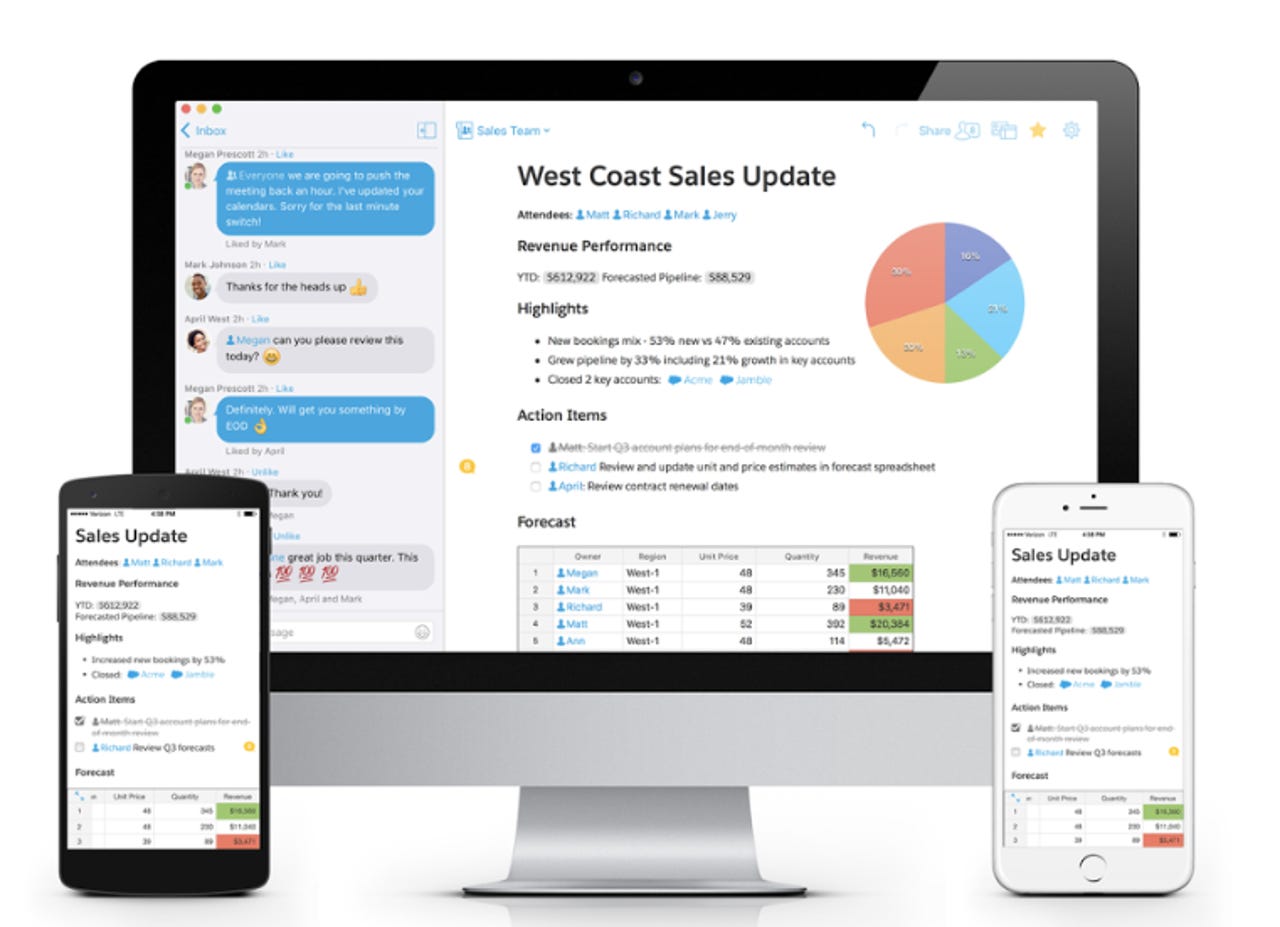Salesforce aims to combine Einstein, Quip, IoT into 'one platform' approach


Image: Salesforce.
Salesforce.com's annual Dreamforce expo kicks off this week, bringing with it a bevy of product announcements and updates across the CRM giant's portfolio.
This year, the Dreamforce centerpiece is Einstein, an artificial intelligence platform that Salesforce has been hyping up for weeks. Salesforce says Einstein "will act as everyone's very own data scientist" by infusing AI throughout the entire Salesforce Platform.
more salesforce
In other words, it's pitched as a way to ease the data scientist talent shortage in business and provide enterprises with tools that are otherwise difficult to develop. In a sales context, Einstein can predict customer behaviors, recommend steps to close a deal and automate certain tasks.
Salesforce said today that Einstein has access to the entire Salesforce data pipe, including activity data from Chatter, email, calendar and e-commerce; social data streams such as tweets and images; and in some cases, IoT signals from participating customers to train AI predictive models. These predictive models are designed to learn and self-tune based on relevant interaction data.
Einstein can also be built into AI-powered apps via commonly used developer tools, Salesforce said. And data scientists and coders can access Predictive Vision and Sentiment Services to train deep learning models to recognize and classify images and sentiment in text.
"The most pivotal thing this year is Einstein," said John Ball, GM of Einstein at Salesforce, during a pre-Dreamforce press conference last week. "It will change every aspect of the products we deliver."
As for Quip, the productivity platform Salesforce acquired in August, the main story also pertains to broader integration with the Salesforce platform. Quip CEO Bret Taylor said his team is aiming to make Quip work across all Salesforce clouds.
"With Quip, we really want to bring productivity into all of these Salesforce products," Taylor said.
For starters, Quip is now allowing Salesforce users to sign-up and log into Quip with their Salesforce credentials, i.e. single-sign on. And with a new Quip Lightning component, teams will be able to link, access and create Quip documents, spreadsheets and task lists directly from within Salesforce.
There's also some news surrounding the company's design framework, Salesforce Lightning. Salesforce is rolling out what it describes as the next generation of Lightning, dubbed Lightning Bolt. Similar to Lightning, the new Bolt iteration serves as a framework for applying a modern, consumer-grade user experience to Salesforce apps.
However, Bolt differs in that it's used to create new community portals or customer-facing websites that integrate with Salesforce CRM. Salesforce says Accenture, Cognizant, Deloitte and PwC have already used Lightning Bolt for industry specific communities and portals.
Lightning Bolt is also getting enhanced productivity features, including a new horizontal navigation bar and redesigned App Launcher, and adaptive, live search capabilities.
Additionally, an update to the Salesforce1 mobile app will let businesses customize the UX with their own colors and logos. Salesforce is betting on the personalization feature to accelerate adoption of the Salesforce1 platform.
Finally, the Salesforce IoT Cloud is getting pumped with more connectivity muscle. First unveiled last September, the Salesforce IoT Cloud, powered by the data processing engine Thunder, is designed to funnel sensor data back to Salesforce channels for near immediate responses to service cases.
Today, Salesforce is announcing a new tool that lets customers visualize streaming event data from more non-Salesforce systems, as well as a new IoT Traffic Monitor designed to give users more insight into how data is impacting the customer experience.
"We have all of the CRM data and are bringing it into a single profile to help make the right decisions on handling customers," said Mike Rosenbaum, executive vice president of CRM applications for Salesforce.
Taking a step back, the big picture message from Salesforce this year is its "one platform" approach. Simply put, Salesforce is trying to close the loop between its products and clouds while at the same time overtaking tech titans like Microsoft and Oracle. It's a daunting task, but we can expect to hear a lot more about Salesforce's strategy as Dreamforce plays out this week.